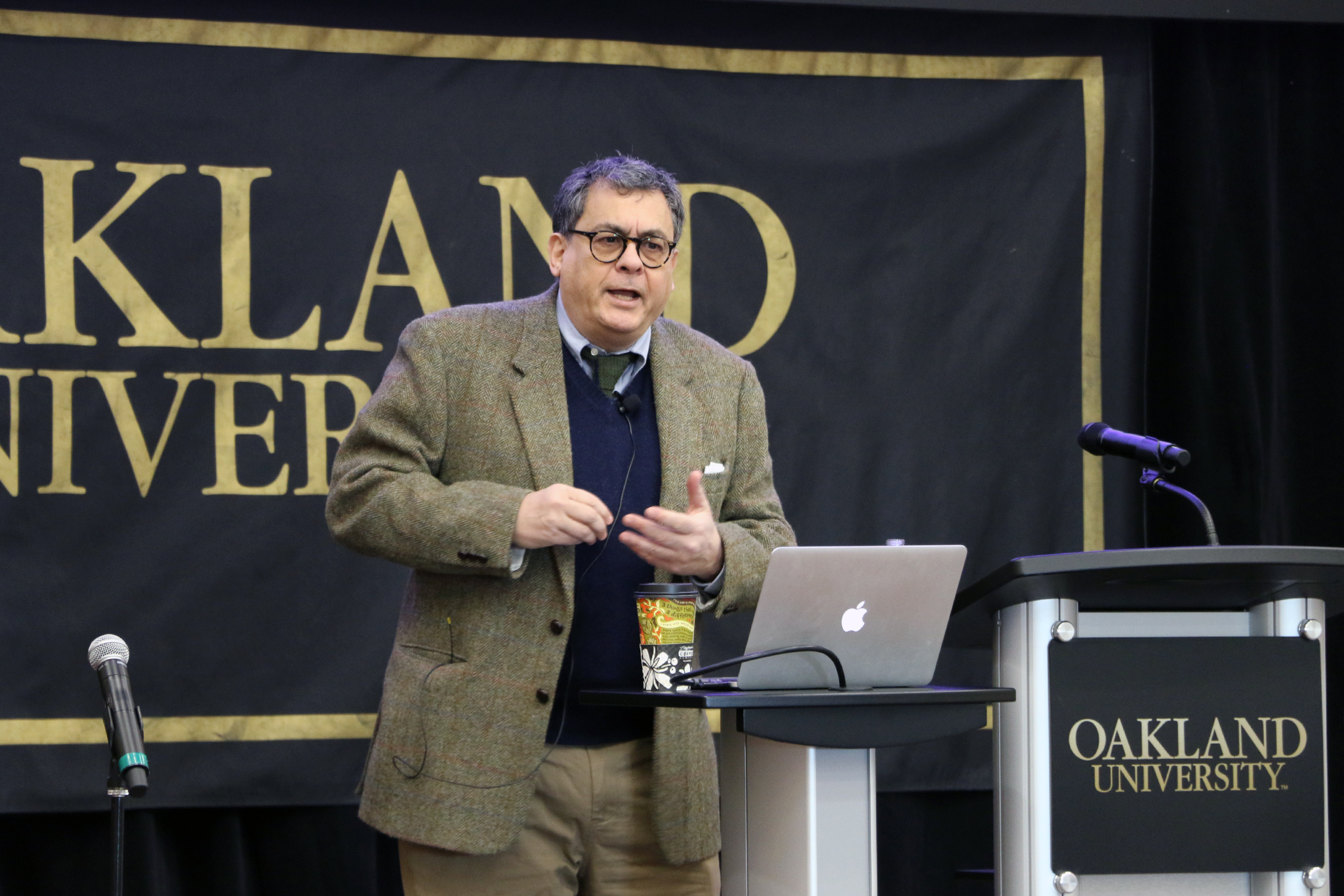
On the same morning it was announced 14 Americans tested positive for coronavirus, an expert in contagious diseases and epidemics visited Oakland University with one primary message: don’t panic.
“When Germs Travel: Coronavirus, Quarantines, and Contagious Crises” was presented by Howard Markel, M.D., Ph.D., on Feb. 17 at Oakland University’s Oakland Center.
Markel, the George E. Wantz Distinguished Professor of the History of Medicine, and director of the Center for the History of Medicine at the University of Michigan, was invited to share his expertise in light of the coronavirus outbreak.
His books include Quarantine!, and When Germs Travel. His articles have appeared in The New York Times, The Journal of the American Medical Association, and The New England Journal of Medicine. He is a regular guest on TV news programs, too.
More than 100 people heard him speak at Oakland University Monday morning.
“There are far greater threats going on right now in our world,” he said after his presentation. “We need to focus and be concerned about this…but there are many, many other infectious and non-infectious threats that we have to face every day.”
In late 2019, reports emerged of a mysterious illness in China later identified as a new type of coronavirus. As Markel noted Monday, it is believed to have come from a so-called “wet market” in Wuhan, the capital of central China's Hubei province. Wet markets sell fresh meat, fish, produce, and other perishable goods, though often lack good hygienic practices, among other things.
Since first publicly identified, tens of thousands of cases have since been confirmed in mainland China, with more than 1,000 dead. Further, hundreds of cases have also been confirmed in other countries and territories. Authorities are now trying to stop the virus spreading further, and restricting millions of people from traveling and introducing strict quarantines.
However, Markel said it’s important to note that of the “tens of thousands” of cases being talked about, 82 percent can be classified as mild.
So why all the fuss?
“Epidemics are framed and shaped — sometimes advanced, and sometimes hindered — by how a given society understands a particular microbe to infect and spread to others,” he said.
Related: OUWB associate professor receives $2.4 million grant to study C. difficile disease Medical expert to present ‘When Germs Travel’ at Oakland University |
Markel said the Oakland University community needs to be concerned about the current coronavirus outbreak “because it’s going on in the world, but I don’t think they need to be worried about it.”
That’s because, he said, with the current coronavirus outbreak there have essentially been two primary forces at work: people in authoritative/governmental positions who aren’t entirely truthful about the seriousness of the disease, and misrepresentation/misunderstanding of the problem by media.
Generally speaking, he said, it’s all part of a “four-act model to an epidemic” being played out.
The model, he said, was first identified by Charles Rosenberg, a Harvard professor and American historian of medicine, and based on the 1947 book The Plague by Albert Camus.
The first act is awareness of occurrences that are “not normal,” Markel said.
“You (notice) more people with respiratory distress. You (see) more people with a rash,” he said, adding “you’re always a couple of steps behind the epidemic.”
The second act is “managing randomness,” or figuring out “how to put it all together, how to explain it to people.”
The next act is “managing the public response.” Markel said this is the act that most applies to the current coronavirus outbreak at this time.
“It’s getting people together to do the things that you want them to do,” said Markel. “Sometimes it’s forcible, sometimes it’s voluntary. It’s trying to manage the crisis so it doesn’t get worse.”
The final act in the “four-act model to an epidemic” is subsidence and retrospection, when the spread of the virus begins to drop off. Markel said he would expect the current coronavirus outbreak to slow in May or June as temperatures rise.
But, he said, the most dangerous part of the epidemic could be what happens next.
“To me, that is the most dangerous part of epidemics in the modern world,” he said, alluding to what he identifies as “profound amnesia,” when public health is working well it is silent.
“Our fascination with the suddenly appearing microbe that kills relatively few in spectacular fashion often trumps our response to infectious scourges that patiently kill millions every year,” Markel said. He hammered home the point by noting that about 14,000 people become infected with HIV every day.
In light of the seemingly constant headlines relating to the current coronavirus outbreak, Markel said he gives credit to Oakland University officials for having the discussion.
“It’s an important topic and I’m delighted that Oakland University invited me,” he said. “I’m glad we’re talking about it because that’s my work…to try and spread common sense about it.”
Oakland University President Ora Pescovitz, M.D., sponsored Markel’s appearance, along with Oakland University’s Provost, OUWB, Oakland University School of Nursing, Oakland University School of Health Sciences, the Department of History, the Center for Civic Engagement, and the Department of Political Science.
Pescovitz said she appreciated Markel visiting Oakland University and that “his perspective is particularly timely now as the world is struggling to contain the coronavirus.”
“(Markel) has really understood, over the decades, the interconnections between medicine, public health, and medical history,” she said, adding that she hoped attendees of Monday’s presentation would feel inspired by Markel’s “compelling insights.”
For more information, contact Andrew Dietderich, marketing writer, OUWB, at [email protected].
Follow OUWB on Facebook, Twitter, and Instagram.
NOTICE: Except where otherwise noted, all articles are published under a Creative Commons Attribution 3.0 license. You are free to copy, distribute, adapt, transmit, or make commercial use of this work as long as you attribute Oakland University William Beaumont School of Medicine as the original creator and include a link to this article.

